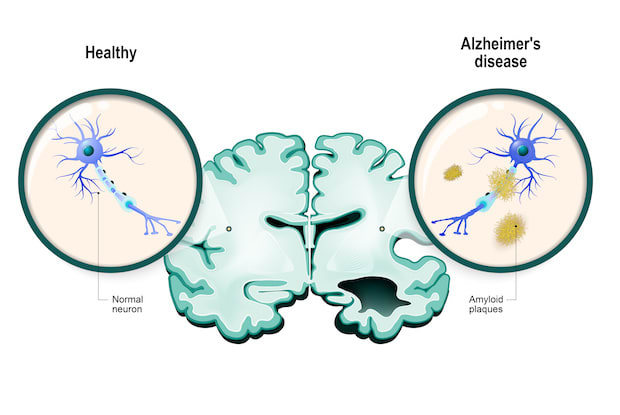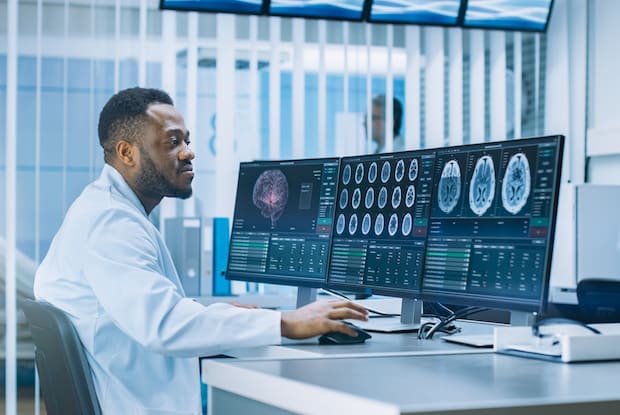Table of Contents
I. Memory loss overview & prevalence
IV. Mild cognitive impairment (MCI)
c. Cognitive & neurological tests
VI. Medications for memory loss
Memory loss overview & prevalence
Memory loss is something that may affect all of us at some point in life. There is often a modest decline in thinking skills as we age. Still, there is a radical difference between forgetting the location of your keys and brain diseases like Alzheimer’s and other memory disorders. [1]
There are over 16 million people who suffer from memory impairment in the United States. About 40 percent of people aged 65 or older have age-associated memory impairment, but only one percent of them will progress to dementia each year. The older you get, the more likely it is that you will experience some sort of memory problem and require medications like Namenda. Read on to learn more about the various types of memory loss disorders and the treatments available. [2]
Symptoms of memory loss
Each memory loss disorder can have its unique signs, but several common symptoms often accompany these disorders.
Subtle short-term memory changes: The changes to memory are often subtle and involve short-term memory. A person may be able to remember something that happened years ago but cannot remember what they had for lunch or why they entered a room.

Speech: An early symptom can involve a person struggling to find the right words to express themselves. A person with early dementia or memory loss disorder will have trouble having a conversation and may repeat words they already said. Following storylines may also be confusing.
Personality change: A person experiencing memory loss could lose interest in hobbies or activities. They also may no longer want to spend time with friends and family. Mood changes are also common, and a once outgoing person can become shy or depressive.
Disorientation: Those with memory loss may lose their sense of direction and become lost more often than usual. People may also forget why they went to the store and could get lost on the way home. [3]
Dementia
Dementia describes a group of symptoms that affect a person’s memory, thinking, and social abilities severely enough to interfere with their daily life. Dementia is sometimes confused as its own specific disease, but many diseases like Alzheimer’s fall under the umbrella of dementia.
Memory loss characterizes dementia, but forgetting a few things does not necessarily mean you have this condition. There are several different types of dementia, and some are reversible, while others are progressive and permanent.
Dementia occurs after damage or loss of nerve cells and their connections in the brain. Different areas of the brain can be affected and cause various symptoms depending on the person. Some vitamin deficiencies and medications may cause dementia-like symptoms, so it is best to consult your doctor if you are feeling more forgetful than usual. [4]
The types of progressive dementias include:
Alzheimer’s disease: Alzheimer’s is the most common type of dementia. It is a progressive brain disease that is caused by a combination of several genetic and environmental factors. Alzheimer’s is characterized by plaque in the brain that progressively hinders a person’s ability to remember, think and eventually, live independently. [5]
Vascular dementia: This is the second most common type of dementia and is caused by damage to the vessels that supply blood to your brain. If the blood vessels are affected, then strokes or damage to the white matter of the brain can occur. Symptoms can include difficulty problem-solving and slowed thinking.
Lewy Body dementia: Lewy bodies are classified as balloon-like clumps of protein that are found in the brains of people with this type of dementia, Alzheimer’s, or Parkinson’s. Some common symptoms can include visual hallucinations, tremors, and problems with focus and attention.
Frontotemporal dementia: This type occurs due to a degeneration of nerve cells and their connections in the frontal and temporal lobes of the brain. The parts of the brain that are affected are those associated with personality, behavior, and language. These symptoms can affect your personality, thinking, judgment, communication, and movement.
Mixed dementia: Upon autopsy, doctors have found that people 80 years or older often have a combination of several types of dementia in their brains. Their brains can often have Lewy body dementia, Alzheimer’s, as well as vascular dementia. [4]

Mild Cognitive Impairment (MCI)
Mild cognitive impairment affects the mental processes that help a person acquire knowledge and understand the processes around them. Approximately 15 to 20 percent of people 65 years or older have some form of MCI. Those with MCI often have memory problems that lead to dementia or Alzheimer’s. The two types of MCI include:
Amnestic MCI: This type affects memory. A person will often forget simple information like appointments, conversations, or recent events.
Nonamnestic MCI: This type affects thinking skills more than memories. This type may involve the inability to make sound decisions and determine the sequence of steps needed to complete a task.
Those with MCI have similar symptoms to most dementias, but other symptoms like depression and feelings of grogginess are relatively common. It is recommended to get the perspective of a close family or friend to see if they notice any difference in your mood or behavior.
The causes of mild cognitive impairment are not entirely understood. Still, MCI usually results from brain changes due to dementias, the beginning stages of Alzheimer’s disease, advanced age, and genetic factors. Those with MCI should be reevaluated every six months to see if their symptoms progress. [6]
When to seek treatment
It can be difficult for people, young or old, to acknowledge that their memory loss may be hindering their quality of life. It can take several months, even years, for memory loss patients to seek treatment. Some may think it is one of those unpleasant effects of aging, but it can be more severe than that and possibly reversible if proper intervention is made.
Memory loss disorders can be hard to diagnosis because memory loss, especially in older people, is fairly common. A doctor must recognize the pattern and the loss of ordinary daily functioning skills to make a proper diagnosis. An examination of your family history may also be helpful to see if your condition is genetic. There is no single test to diagnose memory loss; so many tests can be conducted to determine the problem.
a. Lab tests
Blood tests can detect physical issues that can affect brain function. Some examples include vitamin B-12 deficiency or an underactive thyroid gland. A spinal fluid sample may also be examined for markers of degenerative diseases.
b. Brain scans
A computerized tomography (CT) scan uses x-ray images taken from different angles around the body. This test can create cross-sectional images of bones, blood vessels, and soft tissues like the brain. These scans can check for a stroke, brain bleeding, or tumor.
Positron emission tomography (PET) scans can also be used to reveal how tissues and organs are functioning. PET scans can show brain activity and whether the amyloid protein (an indication of Alzheimer’s disease) is depositing in the brain.
c. Cognitive & neurological tests
Doctors will evaluate the state of your thinking and analyzing processes to see if any gaps in function exist. The tests will measure memory, orientation, language skills, and attention. The neurological tests will focus on your physical abilities. They will test for memory, movement, balance, and reflexes. [7]
Medications for memory loss
Once plaque or proteins start to buildup in the brain, it can be hard to undo tissue damage, but some medications can ease the symptoms of dementia and Alzheimer’s. Medications like cholinesterase inhibitors and memantine can lessen or stabilize symptoms for a limited time. These inhibitors affect certain chemicals involved in carrying messages in the brain.
Cholinesterase inhibitors work by preventing the breakdown of acetylcholine. This is the chemical messenger important for learning and memory. By keeping acetylcholine high, communication among nerve cells remains supported. Some commonly prescribed cholinesterase inhibitors include Aricept (Donepezil), Razadyne (Galantamine), and Exelon (Rivastigmine). [8]
Memantine medications like Namenda are also used to treat some memory loss symptoms. Namenda reduces the actions of chemicals in the brain that may contribute to the symptoms of Alzheimer’s disease. This drug works by blocking substances called glutamates in the brain. Glutamates are believed to be linked to symptoms of Alzheimer’s. [9]
A 2020 research study found that metformin may also slow down a person’s cognitive decline and reduce their risk of dementia. This study was in older adults that have type 2 diabetes and were results were positive. Further studies are planned to investigate this further. [11]

Preventative measures
Memory disorders can be genetic, but there are several things you can do to improve your memory and put off the symptoms of dementia and Alzheimer’s disease.
Exercise: Exercising can help prevent things that can lead to memory loss such as obesity, stroke, high cholesterol, high blood pressure, and diabetes. Some studies also suggest that physical activity triggers the BDNF protein that promotes healthy nerve cells in the brain.
Diet: The “Mediterranean” diet may also help save your memory. This diet involves a lot of fruits, vegetables, fish, and olive oil. This diet favors fish over red meat. It is also best to avoid harmful substances like nicotine and alcohol.
Mental exercise: As you get older, it is essential to keep the brain sharp. It can help your memory if you play cards, join a book club, or participate in puzzles or Sudoku.
Stress: Being under stress is dangerous for your brain. Stress creates a hormone called cortisol, and high levels of cortisol make it harder to pull information from your memory. Yoga, massage, and meditation can help maintain stress levels. [10]
The content in this article is intended for informational purposes only. This website does not provide medical advice. In all circumstances, you should always seek the advice of your physician and/or other qualified health professionals(s) for drug, medical condition, or treatment advice. The content provided on this website is not a substitute for professional medical advice, diagnosis or treatment.
